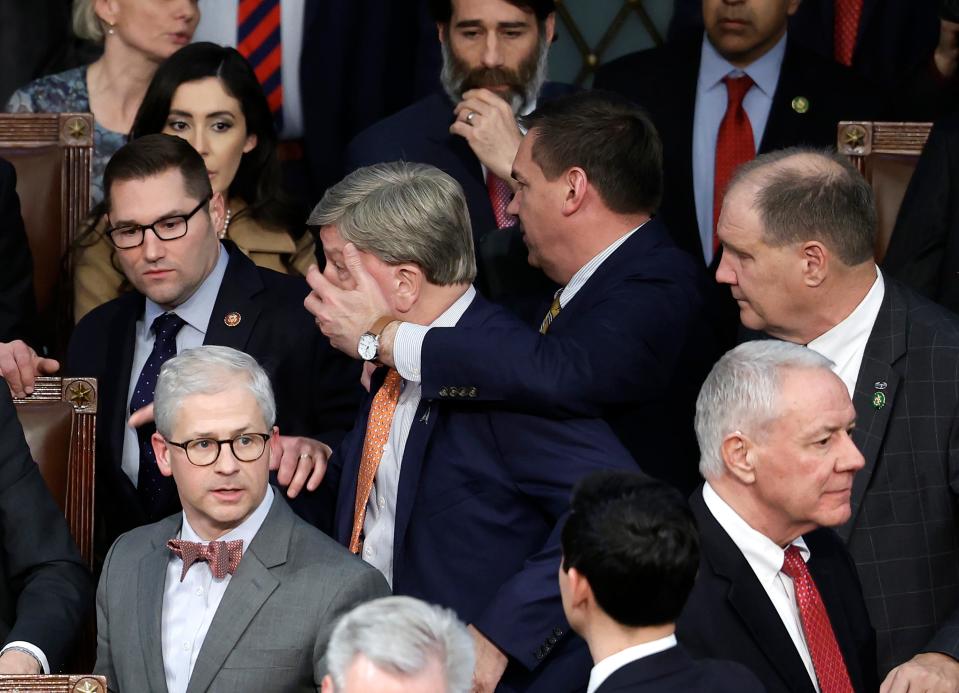Current and former lawmakers know Congress is dysfunctional. Will the infighting stop before the election?
WASHINGTON – Looking on from the sidelines, former Rep. Fred Upton, R-Mich., thinks he retired from Congress at the perfect time.
The former long-serving lawmaker left the House just before Republicans took control of the lower chamber last year. He wasn't in office when a handful of House Republicans joined with Democrats to oust their own leader, prompting a 3-week leadership crisis. He also didn't have to address the conservative insurgencies that embarrassed GOP officials and Congress as a whole.
“Every day someone asks me, ‘Aren’t you glad you left when you did?’” Upton told USA TODAY. “The answer is yes.”
The 118th Congress has been the most dysfunctional in recent memory, current and former lawmakers told USA TODAY. The silver lining is that, until November's general election, the chaos seems to be over. Congress has approved most if not all of the most controversial must-pass legislation that has sparked gridlock and infighting.
And in the House, where much of the disorder originated from the deeply divided GOP majority, House Speaker Mike Johnson, R-La., successfully beat back an ouster threat from conservative agitator Rep. Marjorie Taylor Greene, R-Ga., last week.
With most of the agenda wrapped up (with a few exceptions) and what looks to be one of the greatest defeats for the conservative rebels who have repeatedly thrown the House into turmoil, it appears to be smooth sailing – at least compared to the past few months – for the rest of the 118th Congress.

Most of the bills teed up for a vote for the foreseeable future in the House are primarily aimed at shoring up vulnerable Republican incumbents while dividing the Democratic caucus and putting its most vulnerable swing-district members on the defensive. That includes a bill forcing the Biden administration to continue providing arms to Israel.
Though House Republicans are hoping to pass a slate of government funding bills to prepare for the next spending deadline, which is at the end of September, Upton says that’s wishful thinking in an election year. The former representative, who served for 36 years and entered Congress during the final years of Ronald Reagan's presidency, said lawmakers are bound to pass a short-term extension for the next Congress to deal with government funding. The 119th Congress will begin in January 2025.
“You got bills that are just languishing with nothing done.” Upton said. “They’ll do a (short-term extension) in September because they won’t have any appropriation bills done ... and then they’ll say, ‘We’ll let the next Congress deal with it.’”
“I mean, that’s about it,” that’s left for this Congress, Upton said, calling it “pathetic.”
Current lawmakers also have their doubts that Congress will get a head start on any funding debates.
There’s “really (not) anything big we’ve got to do” left, Rep. Buddy Carter, R-Ga., who is in his fifth term, said, before noting that Republicans also have to start the government funding process for the next fiscal year. But “considering the recent past,” he said it’s hard to imagine Congress will be able to finish that on time.
Former Sen. Byron Dorgan, D-N.D., who also served in the House from 1981-1992, says “things have changed in a very dramatic way,” since his tenure, in part chalking up the decline in productivity and the rise in dysfunction to the growing influence of the hard right. North Dakota has also notably shifted to the right, and Republicans now occupy both his old House and Senate seat.
Nevertheless, Dorgan said he couldn’t entirely discredit the ultraconservative lawmakers: “Even the most bizarre people serving in Congress – and they’re loud and obnoxious – even those folks were elected. Somebody decided they wanted to send them here."
When it comes to passing legislation that actually becomes law, the 118th is in a league of its own. Little more than 60 laws passed by Congress have been signed into law to date, a stark number compared to past Congresses. With less than six months before the election, the 118th won’t be doing much else anymore.
Among some of the most embarrassing and strangest moments for the 118th Congress has been in the House, where conservatives have broken tradition by tanking procedural “rule” votes for bills that govern debates on the House floor. In the past, the majority would always vote for rules, whether or not they oppose the underlying legislation. But conservatives have brushed aside that norm to protest leadership and freeze the House floor.
Congress has historically never drawn favorable approval ratings from Americans looking on. But the 118th Congress has reached new depths, receiving an approval rating of 13%, the lowest since 2017 according to a Gallup survey.
“It’s about as low as it can get,” Dorgan said. “The American people watch this, they see it and they’re sick of it.”
Perhaps nothing underscores the dysfunction in the 118th Congress than a day in November that saw former House Speaker Kevin McCarthy, R-Calif., allegedly elbowing Rep. Tim Burchett, R-Tenn., and House Oversight Committee Chair James Comer, R-Ky., calling freshman Rep. Jared Moskowitz, D-Fla., a “smurf” in the House. On the other side of the Capitol in the Senate, a GOP senator in a hearing challenged a union leader to a fight.
And speaking to the disorder that has frequently roiled the lower chamber, McCarthy, who was on the dais for the 2023 State of the Union address and second in line to the presidency, resigned from Congress entirely last year after he was removed as speaker.
“I’m surprised that we haven’t seen fisticuffs on the House floor frankly,” Upton remarked.

“If all we’re gonna do is come up here and pass messaging bills that we know are not going anywhere,” then House leaders should shorten workweeks in Washington to allow members to spend more time in their districts, Rep. Eric Burlison, R-Mo., a freshman lawmaker, said, describing the agenda as a source of frustration. “I want to get things done.”
This article originally appeared on USA TODAY: Chaos seems to subside in House as lawmakers look toward 2024 election

